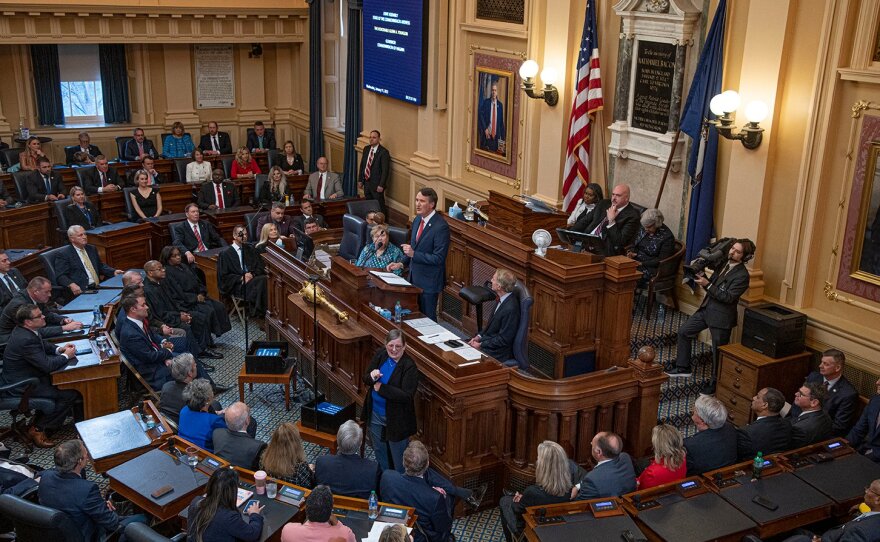RICHMOND, Va. (AP) — Virginia lawmakers have yet to pass an update to the state's two-year budget, leaving about $4 billion of state funds unallocated.
One sticking point has been Gov. Glenn Youngkin's pitch to cut state taxes by about $1 billion. Last year, the Republican pushed for and state lawmakers approved $4 billion in tax cuts and rebates.
But the top budget negotiator for Virginia House Republicans said Monday he offered a compromise nearly two weeks ago that would end his party’s push this year for a reduction in the top individual tax rate, but he's still waiting for a response from Democratic leaders.
“It’s a tremendous compromise,” Del. Barry Knight said of his offer to the Democratic senators with whom he's been working for months to try to reach a resolution on the state's budget stalemate.
Though Democrats were scheduled to meet later this week to discuss Knight's offer, it wasn't clear Monday whether the concession would be enough to end the gridlock.
“They want they want to do one thing, we want to do something else," Senate Democratic Leader Dick Saslaw said.
Knight's proposal would modify an earlier GOP plan by spending more of the state’s multibillion-dollar surplus on one-time tax rebates while dedicating a smaller amount to ongoing tax relief, according to an outline of the offer obtained by The Associated Press.
Knight's proposal does not include a corporate tax cut sought by Republican Gov. Glenn Youngkin, who had also advocated for the now-abandoned cut to the top individual tax rate. Knight, of Virginia Beach, had previously declined to discuss the July 19 counterproposal in detail but granted an interview Monday after AP obtained a copy of the letter.
Knight, who chairs the House Appropriations Committee, has been involved with slow-moving talks with Senate Finance and Appropriations Committee co-chairs Janet Howell and George Barker since the regular session ended earlier this this year without an agreement on a full spending plan.
Though Virginia is flush with cash — running a surplus north of $3 billion, with the exact amount in dispute — the politically divided General Assembly has so far been unable to reach a compromise on how much of it should be spent on core government services like education and behavioral health care, or returned to taxpayers.
Because the state operates on a two-year budget, with the plan initially adopted in even-numbered years and amended in odd-numbered years, the impasse hasn't halted the functioning of the state government, even as the state moved into a new fiscal year July 1. There's already a budget in place.
But the gridlock has created uncertainty and dismayed lobbyists, advocates, school districts and longtime state government observers. Other policy matters ranging from potential casino siting language to public employee raises are also tied up in the negotiations.
Bipartisan talks broke down in late June, after Republicans thought they were close to a deal but Democrats put forward a new proposal of their own.
Knight wrote to Howell and Barker about three weeks later with the latest counteroffer. In his letter, he noted that Democrats in June had called for $907 million in one-time tax relief.
“In keeping with that proposal,” Knight wrote that he was suggesting a package of between $900 million and $1 billion in tax relief in the current fiscal year, of which 80% is one-time spending. The largest item in that bucket would be rebate checks of $175 for a single filer and $350 for joint filers, he wrote. That's in the ballpark of what Senate Democrats proposed last month, according to a policy document they shared with AP at the time.
The latest House GOP plan still calls for further increasing the standard deduction for all Virginians, and it would raise the threshold for the top personal income tax rate from $17,000 to $21,000 — something Knight said was aimed at offering relief to low-income Virginians. It would eliminate the age restriction on a military pension benefit and increase the interest exemption for businesses, according to Knight's letter. But it would drop the previous GOP position that called for lowering the top individual tax rate from 5.75% to 5.5%, something Knight said Democrats had resisted.
In return, he has asked that a similar $800 million of an expected $1 billion in Senate-prescribed spending would be limited to one-time expenditures.
Under the proposed framework, the remaining approximately $1.6B would go toward shared priorities, Knight said in the interview.
Knight said he's had no direct contact with Howell or Barker since the letter penned on July 19 and delivered July 20, which he said he followed with a second letter and a phone call to Barker. He expressed dismay at what he considered an apparent lack of urgency.
Barker and Howell did not respond to phone calls Monday seeking comment.
While Saslaw indicated that the proposal had been widely shared, Mamie Locke, the Senate Democrats' caucus chair and a budget conferee, said in a text message Monday that she did not have a copy and could not discuss it. Sen. Scott Surovell, the caucus vice chair, also said he did not have it.
While insisting that “Virginia deserves a budget,” Knight said if there's no major progress in the next few weeks, it may begin to make more sense to start fresh during next year's legislative session.
Macaulay Porter, a spokeswoman for Youngkin, said in a statement that the governor continues to believe the General Assembly can reach a budget deal that invests in key services and provides tax relief. She said he urges lawmakers to deliver on both, and “quickly,” adding, “Virginians deserve it.”
Every seat in the General Assembly will be on the ballot in the fall.










